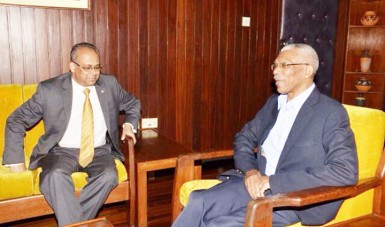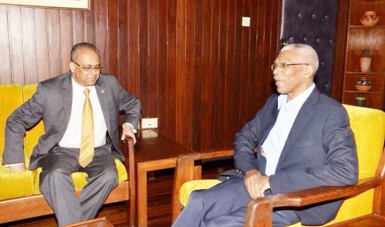The outgoing Deputy Secretary-General of the Organisation of American States (OAS), Albert Ramdin yesterday said that once the relevant institutions have pronounced on the authenticity of an election it is sometimes in the best interest of those contesting the results to move on or provide evidence to the contrary.
“My point is here that elections, especially when they are close elections where there is marginal difference between those who win and those who lose, it always leaves a bad taste.
It always creates problems but we have to recognize that democracy is a process whereby elections, the election outcome once the institutions have pronounced on that and once the time frame for objections and so on have taken place that is time sometimes to move on and to recognize the authority that comes along with it,” Ramdin said during a press conference at the Pegasus Hotel yesterday.

“I am not saying that the party that is not with agreement with the outcome cannot continue with clarifying the position and if there is evidence presenting them…in the meantime a country has to move on and continue,” he said.
Ramdin stated that the outgoing OAS Secretary General Jose Miguel Insulza has already congratulated the newly-elected President, David Granger and his government and “it is up to the PPP now to demonstrate the evidence of where things went wrong”, should they choose.
He emphasised that the OAS is ready and willing to assist with any form of mediation between the government and the People’s Progressive Party. He noted that, “If there are issues where the OAS can play a role in facilitating dialogue, in helping out in the process of getting parties together, that will depend on the circumstances and will depend also upon the invitation of the OAS to do so.”
The Deputy Secretary-General did clarify that there has been no formal invitation from either side while noting however he had spoken to both the coalition government and the PPP on separate occasions.
Ramdin said “we have now a government, we can only hope that once elections are done the country gets back together and looks in one direction for economic development, for social development, in peace and that every group, every political party will take up the responsibility they have whether that is in the Parliament, whether that is in civil society, whether that is in the private sector, each of them of those groups have a responsibility.”
He said that the statement issued by the OAS following the May 11th general election here spoke for itself while noting that he would not be commenting on any findings. This was his response when asked by Stabroek News if the organisation was privy to any irregularities that would provide ground for the PPP/C’s elections-rigging contentions.
Ramdin said that “if a political party does not agree with the outcome then there are ways to deal with that within the electoral framework. If those are taken care of in the sense that they are dealt with in the election framework then there are other opportunities they can use including the court and other mechanisms.”
The OAS statement had called for improvement in the dissemination of the election results while touching on provocative language used on the campaign trail. It didn’t identify any contentious irregularities with the process.
The team stayed in Guyana until May 15 to gather information that it would later produce for the permanent council.
Ramdin, a Surinamese, was addressing members of the media as the Deputy Secretary General for the last time in Guyana as he noted that he was stepping down as of July 10 with his successor Ambassador Nestor Mendez assuming office two days later.
Ramdin said that since his appointment in 2005 and unanimous re-election in 2010 when “Secretary General Insulza and I, when we took office we found a hemisphere that was challenged in many ways … governments who could not enter their term in office even though they were democratically elected, we had financial problems in many countries, in some countries we had conflicts some of them even open arms conflicts and when we leave now I reflect I look back on a hemisphere that is relatively in peace in good prosperity. Countries have made, have enormous growth over the past years.”
He said that everything was a “work in progress,” but that he was grateful for what was accomplished. Speaking to Stabroek News, Ramdin noted that he was most proud of his work in Haiti and with youth organisations. The devastating earthquake in 2010 and subsequent natural disasters in 2012 saw thousands of persons displaced in Haiti. He said of his 10 years that his projects “had to have an impact on the lives of the people I don’t believe in just political debate, ultimately the people want to know what are the results? How will it impact me and my life and my future? And that is what politicians should look at not waste their time on political dialogue, but also on what kind of things we can do for the people.”






